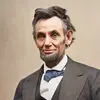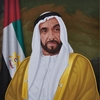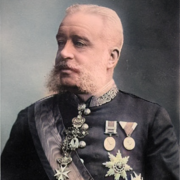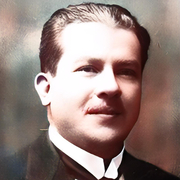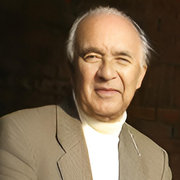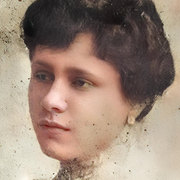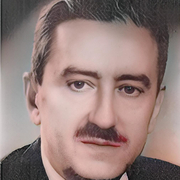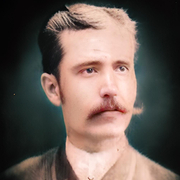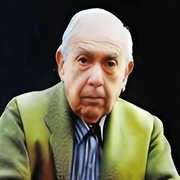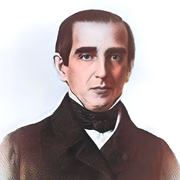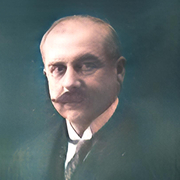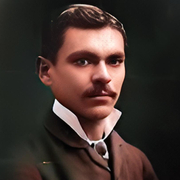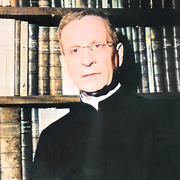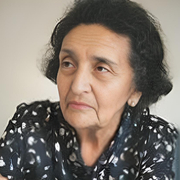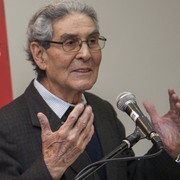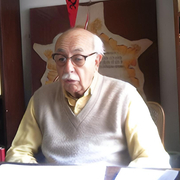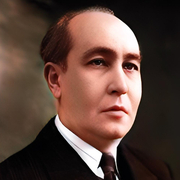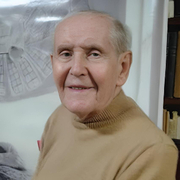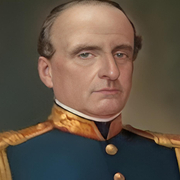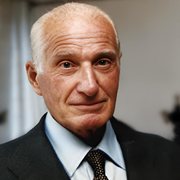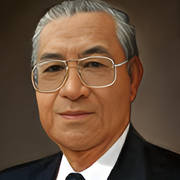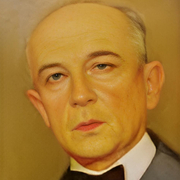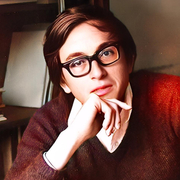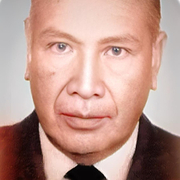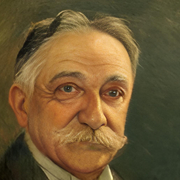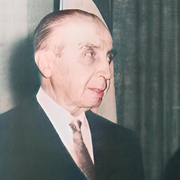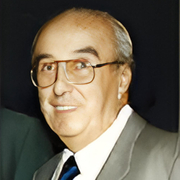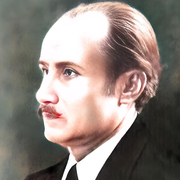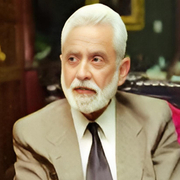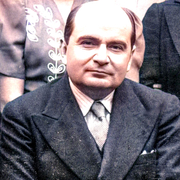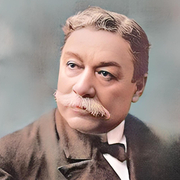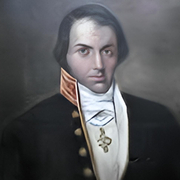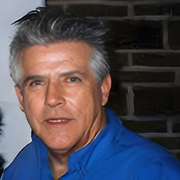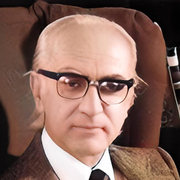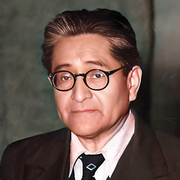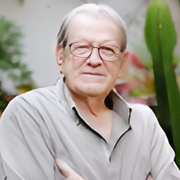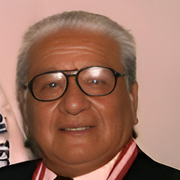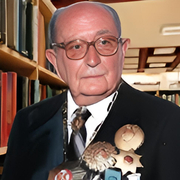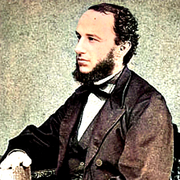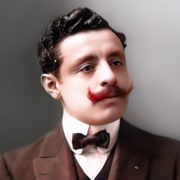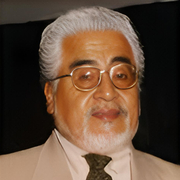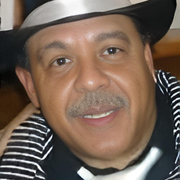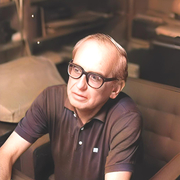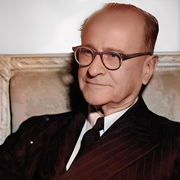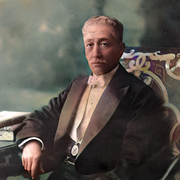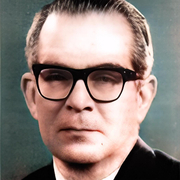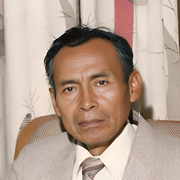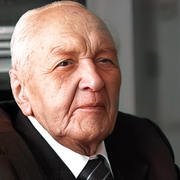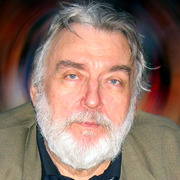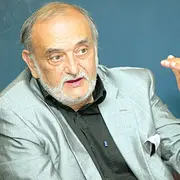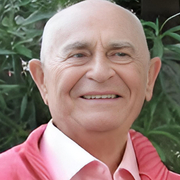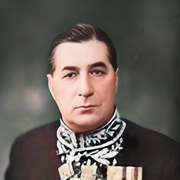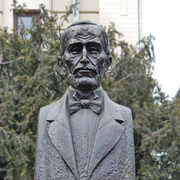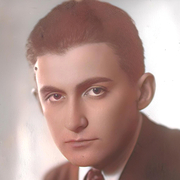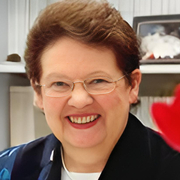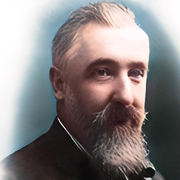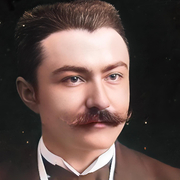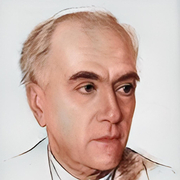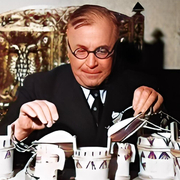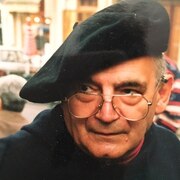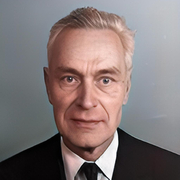 Asif Basra
1967 - 2020
Hindi film and web series actor
Asif Basra
1967 - 2020
Hindi film and web series actor
 Badam Natawan
1924 - 1988
Poet and translator of the Quran
Badam Natawan
1924 - 1988
Poet and translator of the Quran
 Nguyen Khanh
1927 - 2013
Military officer, Head of state
Nguyen Khanh
1927 - 2013
Military officer, Head of state
 Esmeray Diriker
1949 - 2002
Singer, actress
Esmeray Diriker
1949 - 2002
Singer, actress
 Jane Austen
1775 - 1817
Author of six novels, including Pride
Jane Austen
1775 - 1817
Author of six novels, including Pride
 Salim Rashid Suri
1910 - 1979
Sawt Singer
Salim Rashid Suri
1910 - 1979
Sawt Singer
 Saint Valentine
226 - 269
Saint Valentine
226 - 269
 Henry VII
1457 - 1509
King of England and Lord of Ireland
Henry VII
1457 - 1509
King of England and Lord of Ireland
 Sabah Al Fatlawi
1950 - 2018
Iraqi general
Sabah Al Fatlawi
1950 - 2018
Iraqi general
 Nicholas Roerich
1874 - 1947
Avant-garde artist and explorer
Nicholas Roerich
1874 - 1947
Avant-garde artist and explorer
 Niaz Ahmed
1945 - 2000
Fast-medium bowler
Niaz Ahmed
1945 - 2000
Fast-medium bowler
 Midhat Frasheri
1880 - 1949
Writer, activist
Midhat Frasheri
1880 - 1949
Writer, activist
 Jose Eleuterio Gonzalez
1813 - 1888
Physician and founder of UANL
Jose Eleuterio Gonzalez
1813 - 1888
Physician and founder of UANL
 Izzat Traboulsi
1913 - 2000
Governor of the Central Bank of Syria
Izzat Traboulsi
1913 - 2000
Governor of the Central Bank of Syria
 Melihate Ajeti
1935 - 2005
Actress and poet for The Voice of Albania
Melihate Ajeti
1935 - 2005
Actress and poet for The Voice of Albania
 Mauricio Peixoto
1921 - 2019
structural stability of dynamical systems
Mauricio Peixoto
1921 - 2019
structural stability of dynamical systems
 Mario Schenberg
1914 - 1990
divulgation of science and medicine
Mario Schenberg
1914 - 1990
divulgation of science and medicine
 Louis Rene Edouard de Rohan
1734 - 1803
Bishop of Strasbourg, Grand Almoner of France
Louis Rene Edouard de Rohan
1734 - 1803
Bishop of Strasbourg, Grand Almoner of France
 Kim Larsen
1945 - 2018
Singer and musician
Kim Larsen
1945 - 2018
Singer and musician
 Ja'afar Mahmud Adam
1960 - 2007
Salafist Islamic scholar
Ja'afar Mahmud Adam
1960 - 2007
Salafist Islamic scholar
 Jens Tvedt
1857 - 1935
Novelist and short story writer
Jens Tvedt
1857 - 1935
Novelist and short story writer
 Karl Wallenda
1905 - 1978
High wire artist
Karl Wallenda
1905 - 1978
High wire artist
 Achmad Soebardjo
1896 - 1978
Poet, politician, first Foreign Minister
Achmad Soebardjo
1896 - 1978
Poet, politician, first Foreign Minister
 Henri Boudet
1837 - 1915
Priest, amateur archeologist, philologist, writer
Henri Boudet
1837 - 1915
Priest, amateur archeologist, philologist, writer
 Zlata Razdolina
1954 - 2006
Author song singer-songwriter
Zlata Razdolina
1954 - 2006
Author song singer-songwriter
 Le Pho
1907 - 2001
Painter
Le Pho
1907 - 2001
Painter
 Carmen Mondragon
1893 - 1978
Painter and poet
Carmen Mondragon
1893 - 1978
Painter and poet
 Stefan Procopiu
1890 - 1972
Physicist
Stefan Procopiu
1890 - 1972
Physicist
 Gemini Ganesan
1920 - 2005
Actor in Tamil cinema
Gemini Ganesan
1920 - 2005
Actor in Tamil cinema
 Arthur Schopenhauer
1788 - 1860
Philosopher of pessimism
Arthur Schopenhauer
1788 - 1860
Philosopher of pessimism
 Shintaro Katsu
1931 - 1997
Zatoichi, the blind swordsman
Shintaro Katsu
1931 - 1997
Zatoichi, the blind swordsman
 Ayrton Senna da Silva
1960 - 1994
Formula One driver
Ayrton Senna da Silva
1960 - 1994
Formula One driver
 Teodor Keko
1958 - 2002
Writer, journalist, politician
Teodor Keko
1958 - 2002
Writer, journalist, politician
 Ivan Shadr
1887 - 1941
Russian Soviet sculptor and medalist
Ivan Shadr
1887 - 1941
Russian Soviet sculptor and medalist
 Joana Sainz Garcia
1989 - 2019
Super Hollywood Orchestra member
Joana Sainz Garcia
1989 - 2019
Super Hollywood Orchestra member
 Theodor W. Adorno
1903 - 1969
philosopher, sociologist, and music critic
Theodor W. Adorno
1903 - 1969
philosopher, sociologist, and music critic
 Tamara Miansarova
1931 - 2017
Soviet pop and soprano singer
Tamara Miansarova
1931 - 2017
Soviet pop and soprano singer
 Costica Acsinte
1897 - 1984
War photographer
Costica Acsinte
1897 - 1984
War photographer
 Ada Jafri
1924 - 2015
Poet, writer, broadcaster
Ada Jafri
1924 - 2015
Poet, writer, broadcaster
 Thomas Krag
1868 - 1913
Novelist and playwright
Thomas Krag
1868 - 1913
Novelist and playwright
 Guan Qiao
1935 - 2022
welding engineer
Guan Qiao
1935 - 2022
welding engineer
 Francisco Franco
1892 - 1975
Leader of the Nationalist forces
Francisco Franco
1892 - 1975
Leader of the Nationalist forces
 Adam Weishaupt
1748 - 1830
Founder of the Illuminati
Adam Weishaupt
1748 - 1830
Founder of the Illuminati
 Vilhelm Theodor Walther
1819 - 1892
Architect and royal building inspector
Vilhelm Theodor Walther
1819 - 1892
Architect and royal building inspector
 Nguyen Trong Tri
1912 - 1940
Poet
Nguyen Trong Tri
1912 - 1940
Poet
 John Ching Hsiung Wu
1899 - 1986
Jurist, author and translator
John Ching Hsiung Wu
1899 - 1986
Jurist, author and translator
 Clara Wieck Schumann
1819 - 1896
Pianist, composer, and piano teacher
Clara Wieck Schumann
1819 - 1896
Pianist, composer, and piano teacher
 Arsinoe II
-316 - -270
Queen of Thrace, Anatolia, Macedonia, and Egypt
Arsinoe II
-316 - -270
Queen of Thrace, Anatolia, Macedonia, and Egypt
 Julius Exner
1825 - 1910
Genre painter
Julius Exner
1825 - 1910
Genre painter
 Nguyen Tu Nghiem
1918 - 2016
Painter
Nguyen Tu Nghiem
1918 - 2016
Painter
 Paku Alam VIII
1910 - 1998
Regent of Suppa and Batavia, member
Paku Alam VIII
1910 - 1998
Regent of Suppa and Batavia, member
 Humberto Mauro
1897 - 1983
film director, screenwriter, cinematographer
Humberto Mauro
1897 - 1983
film director, screenwriter, cinematographer
 Moosa AbdulRahman Hassan
1902 - 1987
Businessman
Moosa AbdulRahman Hassan
1902 - 1987
Businessman
 Charlemagne
742 - 814
Ruler of the Franks and Holy Roman Emperor
Charlemagne
742 - 814
Ruler of the Franks and Holy Roman Emperor
 Harald Quandt
1921 - 1967
Industrialist
Harald Quandt
1921 - 1967
Industrialist
 Bao Long
1936 - 2007
Crown Prince
Bao Long
1936 - 2007
Crown Prince
 Didi Kempot
1966 - 2020
Campursari singer
Didi Kempot
1966 - 2020
Campursari singer
 Umberto Eco
1932 - 2016
Author
Umberto Eco
1932 - 2016
Author
 Abdul Rahman Pazhwak
1919 - 1995
Diplomat, Poet
Abdul Rahman Pazhwak
1919 - 1995
Diplomat, Poet
 Petre Andrei
1891 - 1940
Sociologist, philosopher, politician
Petre Andrei
1891 - 1940
Sociologist, philosopher, politician
 Sun Fo
1891 - 1973
Premier of the Republic of China
Sun Fo
1891 - 1973
Premier of the Republic of China
 Rocio Jurado
1944 - 2006
Singer and actress of copla, flamenco
Rocio Jurado
1944 - 2006
Singer and actress of copla, flamenco
 Andy Gibb
1958 - 1988
Singer, songwriter
Andy Gibb
1958 - 1988
Singer, songwriter
 Osman Hamdi Bey
1842 - 1910
Painter, archaeologist, museum curator
Osman Hamdi Bey
1842 - 1910
Painter, archaeologist, museum curator
 Heinrich Rudolf Hertz
1857 - 1894
Discovering radio waves
Heinrich Rudolf Hertz
1857 - 1894
Discovering radio waves
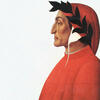 Dante Alighieri
1265 - 1321
Poet, Writer and Philosopher
Dante Alighieri
1265 - 1321
Poet, Writer and Philosopher
 Nguyen Dinh Anh
1940 - 2016
Songwriter and pianist
Nguyen Dinh Anh
1940 - 2016
Songwriter and pianist
 Grigore Alexandrescu
1810 - 1885
poet and fabulist
Grigore Alexandrescu
1810 - 1885
poet and fabulist
 Esteban Terradas i Illa
1883 - 1950
Mathematician, physicist and engineer
Esteban Terradas i Illa
1883 - 1950
Mathematician, physicist and engineer
 Nicodim Munteanu
1864 - 1948
Patriarch
Nicodim Munteanu
1864 - 1948
Patriarch
 Ruan Lingyu
1910 - 1935
Silent film actress
Ruan Lingyu
1910 - 1935
Silent film actress
 Shu Uemura
1928 - 2007
Makeup artist and founder of Shu Uemura Cosmetics
Shu Uemura
1928 - 2007
Makeup artist and founder of Shu Uemura Cosmetics
 Henry IV of England
1367 - 1413
King of England and Lord of Ireland
Henry IV of England
1367 - 1413
King of England and Lord of Ireland
 Sam Eyde
1866 - 1940
Founder of Norsk Hydro and Elkem
Sam Eyde
1866 - 1940
Founder of Norsk Hydro and Elkem
 Raheem Ghamzada
1939 - 2011
Poet, Singer
Raheem Ghamzada
1939 - 2011
Poet, Singer
 Eusebio da Silva Ferreira
1942 - 2014
Footballer
Eusebio da Silva Ferreira
1942 - 2014
Footballer
 Antonio Machado
1875 - 1939
Poet and leading figure of the Generation of '98
Antonio Machado
1875 - 1939
Poet and leading figure of the Generation of '98
 Gerard Debreu
1921 - 2004
Nobel laureate in economics
Gerard Debreu
1921 - 2004
Nobel laureate in economics
 Ezekiel Atang
1973 - 2022
Senior Pastor of God's House Of Refuge
Ezekiel Atang
1973 - 2022
Senior Pastor of God's House Of Refuge
 Mario Camus
1935 - 2021
Film director and screenwriter
Mario Camus
1935 - 2021
Film director and screenwriter
 Hamid bin Muhammad bin Ruzayq
1783 - 1874
Historian, Poet
Hamid bin Muhammad bin Ruzayq
1783 - 1874
Historian, Poet
 Pavel Milyukov
1859 - 1943
Historian and foreign minister
Pavel Milyukov
1859 - 1943
Historian and foreign minister
 George Stephenson
1781 - 1848
Railroad locomotive inventor
George Stephenson
1781 - 1848
Railroad locomotive inventor
 Emil Baerentzen
1799 - 1868
Painter
Emil Baerentzen
1799 - 1868
Painter
 Gabriela Brimmer
1947 - 2000
Writer and activist for people with disabilities
Gabriela Brimmer
1947 - 2000
Writer and activist for people with disabilities
 Zumbi dos Palmares
1655 - 1695
Leader of Quilombo dos Palmares
Zumbi dos Palmares
1655 - 1695
Leader of Quilombo dos Palmares
 Jorgen Ingmann
1925 - 2015
Guitarist and producer
Jorgen Ingmann
1925 - 2015
Guitarist and producer
 Pierre Le Pesant, sieur de Boisguilbert
1646 - 1714
Economic and fiscal reformer
Pierre Le Pesant, sieur de Boisguilbert
1646 - 1714
Economic and fiscal reformer
 Vichit Kounavudhi
1922 - 1997
Film Director, Screenwriter
Vichit Kounavudhi
1922 - 1997
Film Director, Screenwriter
 Andrei Grechko
1903 - 1976
Soviet military commander and Minister
Andrei Grechko
1903 - 1976
Soviet military commander and Minister
 Megumi Yokota
1964 - 1994
Japanese language teacher for North Korean spies
Megumi Yokota
1964 - 1994
Japanese language teacher for North Korean spies
 Berenice IV
-77 - -55
Queen of the Ptolemaic dynasty
Berenice IV
-77 - -55
Queen of the Ptolemaic dynasty
 Carlos Gracida Liceaga
1960 - 2014
Polo player
Carlos Gracida Liceaga
1960 - 2014
Polo player
 Richard Samuel Attenborough
1923 - 2014
Actor, director, producer and Academy Award winner
Richard Samuel Attenborough
1923 - 2014
Actor, director, producer and Academy Award winner
 Nelson Pereira dos Santos
1928 - 2018
Film director
Nelson Pereira dos Santos
1928 - 2018
Film director
 Florentina Ioana Mosora
1940 - 1996
Biophysicist, Actress
Florentina Ioana Mosora
1940 - 1996
Biophysicist, Actress
 Azwar Anas
1931 - 2023
Diplomat, foreign minister, peace broker
Azwar Anas
1931 - 2023
Diplomat, foreign minister, peace broker
 Frederick the Great
1712 - 1786
King of Prussia and military leader
Frederick the Great
1712 - 1786
King of Prussia and military leader
 Umar Rida Kahhala
1905 - 1987
Historian and literature scholar
Umar Rida Kahhala
1905 - 1987
Historian and literature scholar
 Mitsuharu Misawa
1962 - 2009
Professional wrestler and promoter
Mitsuharu Misawa
1962 - 2009
Professional wrestler and promoter
 Attiqur Rahman
1918 - 1996
Poet and scholar of Sindhi literature
Attiqur Rahman
1918 - 1996
Poet and scholar of Sindhi literature
 Lyubov Popova
1889 - 1924
Avant-garde artist and designer
Lyubov Popova
1889 - 1924
Avant-garde artist and designer
 Philip Effiong
1925 - 2003
Military officer and Biafran leader
Philip Effiong
1925 - 2003
Military officer and Biafran leader
 Johann Pachelbel
1653 - 1706
Composer and organist
Johann Pachelbel
1653 - 1706
Composer and organist
 Agus Salim
1884 - 1954
Minister of Foreign Affairs
Agus Salim
1884 - 1954
Minister of Foreign Affairs
 Maurice Paul Krafft
1946 - 1991
Volcanologist
Maurice Paul Krafft
1946 - 1991
Volcanologist
 Charles Maurice de Talleyrand
1754 - 1838
French secularized clergyman, statesman
Charles Maurice de Talleyrand
1754 - 1838
French secularized clergyman, statesman
 Lionel Groulx
1878 - 1967
Historian, Priest
Lionel Groulx
1878 - 1967
Historian, Priest
 Gretl Braun
1915 - 1987
Sister of Eva Braun
Gretl Braun
1915 - 1987
Sister of Eva Braun
 Ellen Winther
1933 - 2011
Singer and actress
Ellen Winther
1933 - 2011
Singer and actress
 Ahmed Faraz
1931 - 2008
Urdu poet, scriptwriter founding Director General
Ahmed Faraz
1931 - 2008
Urdu poet, scriptwriter founding Director General
 Ashraf Abbasi
1923 - 2014
Politician and first male Deputy Speaker
Ashraf Abbasi
1923 - 2014
Politician and first male Deputy Speaker
 Ali Al Wardi
1913 - 1995
Adopting modern social theories
Ali Al Wardi
1913 - 1995
Adopting modern social theories
 Takashi Amano
1954 - 2015
Aquascaping and nature photography
Takashi Amano
1954 - 2015
Aquascaping and nature photography
 Sharif Ali bin al Hussein
1956 - 2022
Leader of the Iraqi Constitutional Monarchy party
Sharif Ali bin al Hussein
1956 - 2022
Leader of the Iraqi Constitutional Monarchy party
 Paul Gregory Green
1973 - 2022
Rugby league player and coach
Paul Gregory Green
1973 - 2022
Rugby league player and coach
 Homer
-701 - -800
Epic poet
Homer
-701 - -800
Epic poet
 Muhammad Hassanein Heikal
1923 - 2016
Editor-in-chief of Al-Ahram
Muhammad Hassanein Heikal
1923 - 2016
Editor-in-chief of Al-Ahram
 Vasco Nunez de Balboa
1475 - 1519
Explorer and governor of Panama
Vasco Nunez de Balboa
1475 - 1519
Explorer and governor of Panama
 Abdulkadir Kure
1956 - 2017
Governor of Niger State
Abdulkadir Kure
1956 - 2017
Governor of Niger State
 Jose Jose
1948 - 2019
Latin pop singer
Jose Jose
1948 - 2019
Latin pop singer
 Davy Jones
1945 - 2012
Lead singer of The Monkees
Davy Jones
1945 - 2012
Lead singer of The Monkees
 Maks Klodic-Sabladoski
1875 - 1953
Civil Engineer
Maks Klodic-Sabladoski
1875 - 1953
Civil Engineer
 Sha Fei
1912 - 1950
Photojournalist and war photographer
Sha Fei
1912 - 1950
Photojournalist and war photographer
 Dilshad Meriwani
1947 - 1989
Poet and activist for Kurdish language and culture
Dilshad Meriwani
1947 - 1989
Poet and activist for Kurdish language and culture
 Musa Bin Jaafar Bin Hassan
1950 - 2020
Diplomat
Musa Bin Jaafar Bin Hassan
1950 - 2020
Diplomat
 Joao Domingos Bomtempo
1775 - 1842
Composer and pianist
Joao Domingos Bomtempo
1775 - 1842
Composer and pianist
 Constantin Cristescu
1866 - 1923
Lieutenant General
Constantin Cristescu
1866 - 1923
Lieutenant General
 Halim Perdanakusuma
1922 - 1947
Deputy Army chief-of-staff
Halim Perdanakusuma
1922 - 1947
Deputy Army chief-of-staff
 Arthur Wellesley
1769 - 1852
Defeating Napoleon at the Battle of Waterloo
Arthur Wellesley
1769 - 1852
Defeating Napoleon at the Battle of Waterloo
 Farrukh Fateh Ali Khan
1952 - 2003
Harmonium player, qawwali singer
Farrukh Fateh Ali Khan
1952 - 2003
Harmonium player, qawwali singer
 Johan Svendsen
1840 - 1911
Composer, conductor, violinist
Johan Svendsen
1840 - 1911
Composer, conductor, violinist
 Ishmeet Singh
1988 - 2008
Playback singer and musician
Ishmeet Singh
1988 - 2008
Playback singer and musician
 Carmen Salinas
1939 - 2021
Actress, impressionist, comedian, politician
Carmen Salinas
1939 - 2021
Actress, impressionist, comedian, politician
 Gustav Winckler
1925 - 1979
Singer and musician
Gustav Winckler
1925 - 1979
Singer and musician
 Gamal al-Ghitani
1945 - 2015
Historical and political novels and commentaries
Gamal al-Ghitani
1945 - 2015
Historical and political novels and commentaries
 Lone Maslocha
1921 - 1945
Photographer, resistance fighter, courier
Lone Maslocha
1921 - 1945
Photographer, resistance fighter, courier
 Miha Baloh
1928 - 2022
Actor
Miha Baloh
1928 - 2022
Actor
 Eugenia Osterberger
1852 - 1932
Composer and pianist
Eugenia Osterberger
1852 - 1932
Composer and pianist
 Aesop
-564 - -620
Fabulist and storyteller
Aesop
-564 - -620
Fabulist and storyteller
 Niccolo Paganini
1782 - 1840
Violinist
Niccolo Paganini
1782 - 1840
Violinist
 Jose Francisco Ruiz Massieu
1946 - 1994
Governor of Guerrero and Secretary-General of PRI
Jose Francisco Ruiz Massieu
1946 - 1994
Governor of Guerrero and Secretary-General of PRI
 Shih Kien
1913 - 2009
Playing villains in Hong Kong martial arts films
Shih Kien
1913 - 2009
Playing villains in Hong Kong martial arts films
 Guo Moruo
1892 - 1978
Author, poet, historian, archaeologist
Guo Moruo
1892 - 1978
Author, poet, historian, archaeologist
 Liang Sili
1924 - 2016
Aerospace engineer
Liang Sili
1924 - 2016
Aerospace engineer
 Plinio Marcos
1935 - 1999
Writer, actor and playwright
Plinio Marcos
1935 - 1999
Writer, actor and playwright
 Lam Uyen Nhi
1975 - 2007
Beauty Contest Winner
Lam Uyen Nhi
1975 - 2007
Beauty Contest Winner
 Hebe Camargo
1929 - 2012
TV host, singer and actress
Hebe Camargo
1929 - 2012
TV host, singer and actress
 Antonio Buero Vallejo
1916 - 2000
Playwright, jurist, thinker, journalist, poet
Antonio Buero Vallejo
1916 - 2000
Playwright, jurist, thinker, journalist, poet
 Prajim Wongsuwan
1938 - 1990
Novelist and Sprinter
Prajim Wongsuwan
1938 - 1990
Novelist and Sprinter
Top 10 Died Influential People
Show AllToday's Death Anniversary
Show AllToday's Birth
Show AllDead People On Map
Show AllLoading
Preparing Map...
--
--
Age:
--
--
Resting Place:
--
--
Slogan:
--
World dead famouses:
Tap To Show
Why our famous is important?
Abraham Lincoln
Pyotr Bagration
Mustafa Kemal Ataturk
William Shakespeare
Stephen the Great
Faisal I of Iraq
Nicolaus Copernicus
Robert Gordon Menzies
Zayed bin Sultan Al Nahyan
Emperor Pedro II
Celebrities & culture of countries
The purpose of lorem ipsum is to create a natural looking block of text (sentence, paragraph, page, etc.) that doesn't distract from the layout. A practice not without controversy, laying out pages with meaningless filler text can be very useful when the focus is meant to be on design, not content. The passage experienced a surge in popularity during the 1960s when Letraset used it on their dry-transfer sheets, and again during the 90s as desktop publishers bundled the text with their software. Today it's seen all around the web; on templates, websites, and stock designs. Use our generator to get your own, or read on for the authoritative history of lorem ipsum.
More Information





























